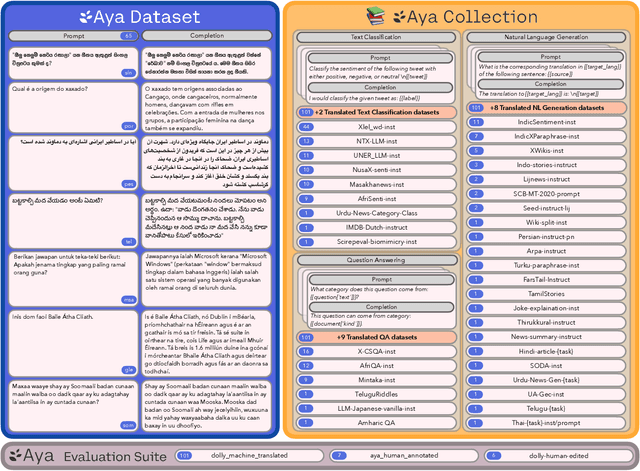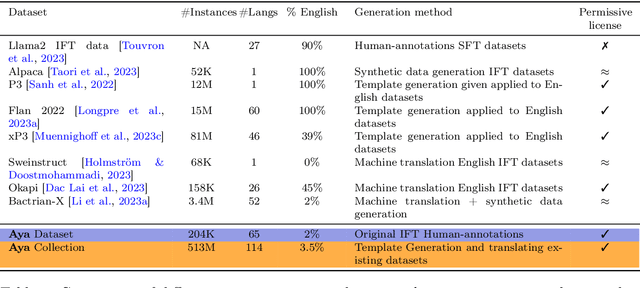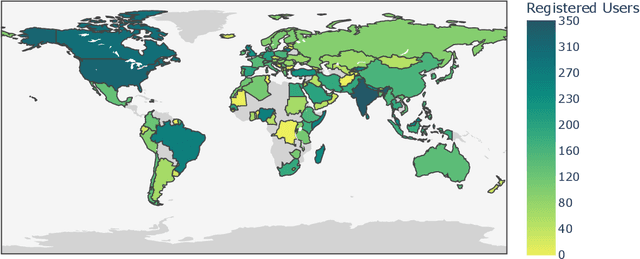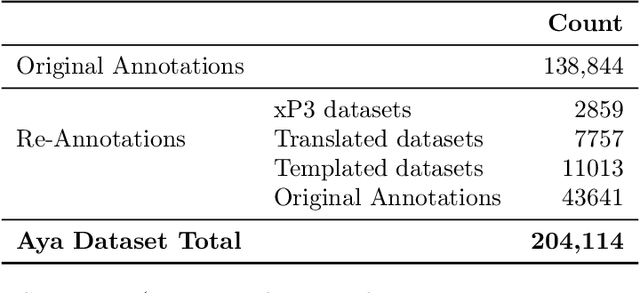Wei-Yin Ko
The Art of Asking: Multilingual Prompt Optimization for Synthetic Data
Oct 22, 2025Abstract:Synthetic data has become a cornerstone for scaling large language models, yet its multilingual use remains bottlenecked by translation-based prompts. This strategy inherits English-centric framing and style and neglects cultural dimensions, ultimately constraining model generalization. We argue that the overlooked prompt space-the very inputs that define training distributions-offers a more powerful lever for improving multilingual performance. We introduce a lightweight framework for prompt-space optimization, where translated prompts are systematically transformed for Naturalness, Cultural Adaptation, and Difficulty Enhancement. Using an off-the-shelf multilingual LLM, we apply these transformations to prompts for 12 languages spanning 7 families. Under identical data conditions, our approaches achieve substantial and consistent downstream improvements over the translation-only baseline: +4.7% on Global-MMLU accuracy, +2.4% on Flores XCometXL and +35.3% wins in preferences on mArenaHard. We establish prompt-space optimization as a simple yet powerful paradigm for building multilingual LLMs that are more robust, culturally grounded, and globally capable.
The Multilingual Divide and Its Impact on Global AI Safety
May 27, 2025Abstract:Despite advances in large language model capabilities in recent years, a large gap remains in their capabilities and safety performance for many languages beyond a relatively small handful of globally dominant languages. This paper provides researchers, policymakers and governance experts with an overview of key challenges to bridging the "language gap" in AI and minimizing safety risks across languages. We provide an analysis of why the language gap in AI exists and grows, and how it creates disparities in global AI safety. We identify barriers to address these challenges, and recommend how those working in policy and governance can help address safety concerns associated with the language gap by supporting multilingual dataset creation, transparency, and research.
Command A: An Enterprise-Ready Large Language Model
Apr 01, 2025



Abstract:In this report we describe the development of Command A, a powerful large language model purpose-built to excel at real-world enterprise use cases. Command A is an agent-optimised and multilingual-capable model, with support for 23 languages of global business, and a novel hybrid architecture balancing efficiency with top of the range performance. It offers best-in-class Retrieval Augmented Generation (RAG) capabilities with grounding and tool use to automate sophisticated business processes. These abilities are achieved through a decentralised training approach, including self-refinement algorithms and model merging techniques. We also include results for Command R7B which shares capability and architectural similarities to Command A. Weights for both models have been released for research purposes. This technical report details our original training pipeline and presents an extensive evaluation of our models across a suite of enterprise-relevant tasks and public benchmarks, demonstrating excellent performance and efficiency.
Aya Expanse: Combining Research Breakthroughs for a New Multilingual Frontier
Dec 05, 2024



Abstract:We introduce the Aya Expanse model family, a new generation of 8B and 32B parameter multilingual language models, aiming to address the critical challenge of developing highly performant multilingual models that match or surpass the capabilities of monolingual models. By leveraging several years of research at Cohere For AI and Cohere, including advancements in data arbitrage, multilingual preference training, and model merging, Aya Expanse sets a new state-of-the-art in multilingual performance. Our evaluations on the Arena-Hard-Auto dataset, translated into 23 languages, demonstrate that Aya Expanse 8B and 32B outperform leading open-weight models in their respective parameter classes, including Gemma 2, Qwen 2.5, and Llama 3.1, achieving up to a 76.6% win-rate. Notably, Aya Expanse 32B outperforms Llama 3.1 70B, a model with twice as many parameters, achieving a 54.0% win-rate. In this short technical report, we present extended evaluation results for the Aya Expanse model family and release their open-weights, together with a new multilingual evaluation dataset m-ArenaHard.
Global MMLU: Understanding and Addressing Cultural and Linguistic Biases in Multilingual Evaluation
Dec 04, 2024



Abstract:Cultural biases in multilingual datasets pose significant challenges for their effectiveness as global benchmarks. These biases stem not only from language but also from the cultural knowledge required to interpret questions, reducing the practical utility of translated datasets like MMLU. Furthermore, translation often introduces artifacts that can distort the meaning or clarity of questions in the target language. A common practice in multilingual evaluation is to rely on machine-translated evaluation sets, but simply translating a dataset is insufficient to address these challenges. In this work, we trace the impact of both of these issues on multilingual evaluations and ensuing model performances. Our large-scale evaluation of state-of-the-art open and proprietary models illustrates that progress on MMLU depends heavily on learning Western-centric concepts, with 28% of all questions requiring culturally sensitive knowledge. Moreover, for questions requiring geographic knowledge, an astounding 84.9% focus on either North American or European regions. Rankings of model evaluations change depending on whether they are evaluated on the full portion or the subset of questions annotated as culturally sensitive, showing the distortion to model rankings when blindly relying on translated MMLU. We release Global-MMLU, an improved MMLU with evaluation coverage across 42 languages -- with improved overall quality by engaging with compensated professional and community annotators to verify translation quality while also rigorously evaluating cultural biases present in the original dataset. This comprehensive Global-MMLU set also includes designated subsets labeled as culturally sensitive and culturally agnostic to allow for more holistic, complete evaluation.
Understanding and Mitigating Language Confusion in LLMs
Jun 28, 2024Abstract:We investigate a surprising limitation of LLMs: their inability to consistently generate text in a user's desired language. We create the Language Confusion Benchmark (LCB) to evaluate such failures, covering 15 typologically diverse languages with existing and newly-created English and multilingual prompts. We evaluate a range of LLMs on monolingual and cross-lingual generation reflecting practical use cases, finding that Llama Instruct and Mistral models exhibit high degrees of language confusion and even the strongest models fail to consistently respond in the correct language. We observe that base and English-centric instruct models are more prone to language confusion, which is aggravated by complex prompts and high sampling temperatures. We find that language confusion can be partially mitigated via few-shot prompting, multilingual SFT and preference tuning. We release our language confusion benchmark, which serves as a first layer of efficient, scalable multilingual evaluation at https://github.com/for-ai/language-confusion.
Aya Model: An Instruction Finetuned Open-Access Multilingual Language Model
Feb 12, 2024



Abstract:Recent breakthroughs in large language models (LLMs) have centered around a handful of data-rich languages. What does it take to broaden access to breakthroughs beyond first-class citizen languages? Our work introduces Aya, a massively multilingual generative language model that follows instructions in 101 languages of which over 50% are considered as lower-resourced. Aya outperforms mT0 and BLOOMZ on the majority of tasks while covering double the number of languages. We introduce extensive new evaluation suites that broaden the state-of-art for multilingual eval across 99 languages -- including discriminative and generative tasks, human evaluation, and simulated win rates that cover both held-out tasks and in-distribution performance. Furthermore, we conduct detailed investigations on the optimal finetuning mixture composition, data pruning, as well as the toxicity, bias, and safety of our models. We open-source our instruction datasets and our model at https://hf.co/CohereForAI/aya-101
Aya Dataset: An Open-Access Collection for Multilingual Instruction Tuning
Feb 09, 2024



Abstract:Datasets are foundational to many breakthroughs in modern artificial intelligence. Many recent achievements in the space of natural language processing (NLP) can be attributed to the finetuning of pre-trained models on a diverse set of tasks that enables a large language model (LLM) to respond to instructions. Instruction fine-tuning (IFT) requires specifically constructed and annotated datasets. However, existing datasets are almost all in the English language. In this work, our primary goal is to bridge the language gap by building a human-curated instruction-following dataset spanning 65 languages. We worked with fluent speakers of languages from around the world to collect natural instances of instructions and completions. Furthermore, we create the most extensive multilingual collection to date, comprising 513 million instances through templating and translating existing datasets across 114 languages. In total, we contribute four key resources: we develop and open-source the Aya Annotation Platform, the Aya Dataset, the Aya Collection, and the Aya Evaluation Suite. The Aya initiative also serves as a valuable case study in participatory research, involving collaborators from 119 countries. We see this as a valuable framework for future research collaborations that aim to bridge gaps in resources.
FAIR-Ensemble: When Fairness Naturally Emerges From Deep Ensembling
Mar 01, 2023Abstract:Ensembling independent deep neural networks (DNNs) is a simple and effective way to improve top-line metrics and to outperform larger single models. In this work, we go beyond top-line metrics and instead explore the impact of ensembling on subgroup performances. Surprisingly, even with a simple homogenous ensemble -- all the individual models share the same training set, architecture, and design choices -- we find compelling and powerful gains in worst-k and minority group performance, i.e. fairness naturally emerges from ensembling. We show that the gains in performance from ensembling for the minority group continue for far longer than for the majority group as more models are added. Our work establishes that simple DNN ensembles can be a powerful tool for alleviating disparate impact from DNN classifiers, thus curbing algorithmic harm. We also explore why this is the case. We find that even in homogeneous ensembles, varying the sources of stochasticity through parameter initialization, mini-batch sampling, and the data-augmentation realizations, results in different fairness outcomes.
 Add to Chrome
Add to Chrome Add to Firefox
Add to Firefox Add to Edge
Add to Edge